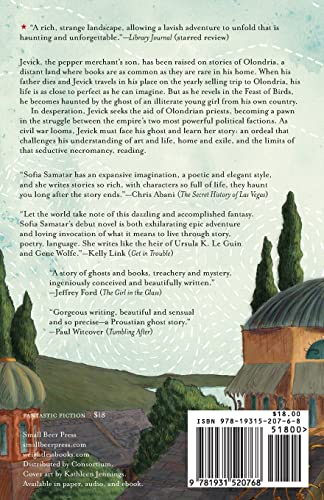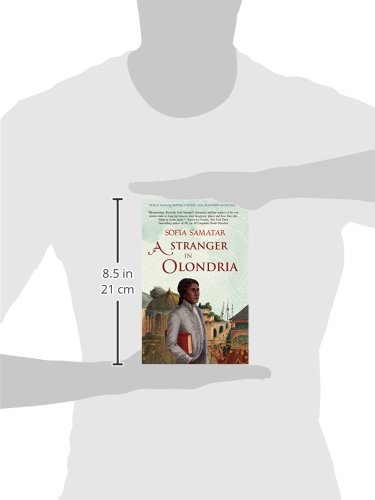معلومات عنا
حقوق الطبع والنشر © 2024 Desertcart Holdings Limited




Full description not available
J**L
Special story, lovingly told
Okay this is hard, because it's a combination of a deep and fulsome 4 stars and a like -2 star feeling that occasionally tugged at me. Lemme explain.I read this book because I was looking for genre fiction I could get behind on a sentence-by-sentence basis, and lemme say right away that it fit that criterion. And I think any criticisms of the prose I would have--that maybe it lapses into the floral occasionally; that there are perhaps more similes/metaphors per paragraph than I might like--are (a) borne of a more fundamental gripe (bel0w) and (b) wrong, meaning, based on my own brain's summary idea of those metaphors rather than actual experience of them as a reader, because basically: Samatar is a lovely, lovely writer. This is a book where you underline lots of sentences.It's also a book where you spend a long time waiting for the story to start; then are pleased and excited when it starts; then are maddened by frequent digressions of that narrative, to a degree that seemed almost spiteful to me at some points; then are satisfied by the soft landing of that narrative and do see, ultimately, why Samatar put all those digressions in.I tend to view things in technical terms, and the frustration I keep mentioning is: this is clearly (and lovelily) a story about stories and language; in serving that function the form is full of stories; I think I wish that the author had included a couple less long, digressive stories as the narrative began to pull forward.But I get why she did, and maybe that was the only way to achieve what she did: a story that really carries with it a sense of the magic of learning and "story", imparting stories and sharing them and passing them between peoples and across times. It's an unusual book, a sometimes maddening book, and a special book. I'm glad I read it.
J**W
A Powerful Literary Fantasy
The boy Jevick longs to get away from his cruel father's island pepper plantation and imagines life in the capital city of Bain. His father brings him a tutor from Olondria, and Jevick learns to read and write the great city's literature. When his father dies, he finally gets his chance to travel to the mainland. On the ship he briefly meets a girl, Jissavet.Jissavet has a wasting disease called kyitna, which turns her hair red. Everyone shuns her, because the disease is both communicable and fatal.After some adventures in Bain where the naive boy is robbed, drugged, and kidnapped, he goes insane and is committed. While recovering, he hears that the girl he met on the ship has died and her body was not properly burned. He is shocked, as in his country, this is a sacred rite, or the spirit is doomed to walk the earth forever as an angel. The impressionable boy immediately becomes haunted by Jissavet and embarks on a quest to find her remains and burn them. The question is whether Jissavet will allow him to do this.While it's full of mythical tales, poetry, and parables, Sofia Samatar's "A Stranger in Olondria" is a basically a ghost story. But it is unusual in that in most "Western" ghost stories the ghost moves on once the reason it still hangs around is revealed. This ghost lingers around so long that the protagonist falls in love with her. She claims she'll free him if he writes a vallon (epic poem) about her. In a sort of Stockholm Syndrome fraught with suffering, he says of her, "She was so alive, so alive I forgot that the name of the life she lived was death."The language is dense and beautiful, and the reader will be rewarded for sticking with it to the wistful yet disquieting ending. Jevick has much to teach us."A Stranger in Olondria" has been nominated for a Nebula for best novel of 2013, and Samatar has been nominated for the John W. Campbell Award (best new writer) at the 2014 Hugos.
W**T
Lots of adjectives, moderate story, very pretty
On the surface, this book is a love song to books wrapped in a coming-of-age-travel-story. Jevick is an overeducated misfit when he goes to Paris, er Bain, to carry on the family business, but he is much more interested in the culture than the business. In the process of his cultural education, he comes down with a bad case of ghost. Travails ensue.It's not that I don't love ornate imagery and fabulous language. It's that by 3/4 of the way through this book, I was longing for something to cut the greasy, heavy, oleaginous feeling of the adjectival piles that litter the story. It feels to me like it could be a much more emotionally engaging story if it weren't paced with two adjectives per noun. I'm sure that's a personal preference issue, because I know a lot of people who enjoyed the ornate filigree of the writing.I think my favorite part is the end, when he takes all his frustrated passion and turns it around into something that improves the world. But I almost gave up halfway through because the pace was so hard for me.Read if: You are looking for a Gentleman's Progress And Return Home story, if you love a good unrequitable love story or three, if you want to think about nameless spices that can kill on the wind and be bought in the market.Skip if: You are an impatient reader, you are going to feel bad about having to use a dictionary to read a book. (For the first time in three or so years, I used my kindle dictionary. "Marmoreal -- made of or relating to marble.")
A**D
An erudite and thoughtful love letter to the power of story
Jevick of Tyom has grown up on an isolated island. He is given a tutor from the far-off empire of Olondria, who teaches him to read and fills his head with stories of that distant land. Circumstances lead Jevick to Bain, Olondria's cultured capital, where he fills his days with parties and books, but he is also haunted by an encounter with a dying girl from his own land. Soon civil war threatens the country and Jevick embarks on a journey to rid himself of his spiritual discomfort, unaware of the events that will be set in motion.First published in 2013, A Stranger in Olondria is the debut novel by the poet Sofia Samatar. An unusual book, the novel is not a traditional epic or secondary world fantasy, despite a vividly composed world with well thought-out histories, customs and geography, but a tone and mood piece hinging on themes such as learning, regret, language and the essence of story.The novel's writing reminded me in turn of Guy Gavriel Kay and Ursula K. Le Guin, but with a unique atmosphere that is the author's own. There are very occasional bursts of action (a brief brawl, a confused flight through the countryside) but the book reveals its story and intentions through dialogue, thoughts and smaller short stories which are inset through the narrative. Jevick's function is sometimes less that of a protagonist than a sounding board or sponge, soaking up other characters' stories. He does have his own character arc though: Jevick's status as an outsider to Olondria gives him a fresh perspective on the empire and its complex royal and religious politics, but also makes him a pawn in the game between the two sides, one of whom imprisons him for insanity and the other liberates him as a symbol of resistance.The book is also a love letter to the idea of reading stories and collecting books, which will no doubt warm the hearts of almost all book readers. Jevick's early distrust of books, which do not exist on his home island and where people do not read, gives way to almost drowning in the stories and ideas he finds on the pages of his tutor's collection. Later in the book he embarks on teaching his own community to read, and sharing the joy that comes from his experiences with them.The novel's quiet, thoughtful prose is erudite and at times beautiful. Characterisation is strong, I always had an excellent sense of Jevick's motivations and, through his eyes, those of the characters he meets. I did feel his initial relationship with Jissavet was a bit too slight given their later closeness, and the pacing is sometimes uneven. In particular, much of the last quarter or so of the book is given over to Jissavet's backstory which is intriguing and powerful, but feels almost like a self-contained novella within the book's larger narrative. Jevick's story feels somewhat rushed to a conclusion in the handful of pages left after Jissavet's story concludes. It may also be that Samatar is less successful than the likes of Le Guin and Kay in weaving beautiful prose and thoughtful themes around a central plot and advancing all well simultaneously.For that, A Stranger in Olondria is (****½) is still an accomplished novel. More of a mood piece than a plot-driven book, it has a haunting quality that will stick with the reader long after it is finished. The author has a further novel set in the same world, The Winged Histories.
M**S
Wonderful. I read 40 pages and then dreamt that ...
Wonderful. I read 40 pages and then dreamt that night that I was within the world of the novel, in hallucinatory detail. I loved it fiercely---an absolutely extraordinary piece of work.
M**N
Beautiful
Beautiful writing
S**G
Dense, lengthy and dull
I just couldn't get this going, the writing was so stodgy and slow. Emphasis was on tedious description of place, rather than character interactions, and I am not a one to admire that. I DNF at under 100 pages when I have a rule that I must try to get that far in. Very disappointing. I'm deleting this as I know already it's not a book where I just need to be in a different frame of mind to get into it. It's just not written in a style I like.
G**N
This is my favourite fantasy novel bar none -- Tolkien and Le Guin ...
This is my favourite fantasy novel bar none -- Tolkien and Le Guin have had more impact, but this is my personal favourite. Why? This is the most beautiful prose I have ever read. Also, the story, when its jaws close is utterly gripping. There is a bit of a problem for some readers -- the hero is remembering a happy childhood and a trip as an adult to the metropolis. All rather pleasant. When the trap is sprung about 25% of the way in, it is well and truly sprung. That is a bit late for readers who don't like tales of everyday life. Finally, there is no more African a fantasy novel -- this is about coping with diaspora, about coping with a culture that offers great beauties but which exploits you and disrespects you. The attitude towards literature is both loving and aware that it embodies the power of the metropolis. This ambiguity has deep roots in the African oral tradition. Nothing is unambiguously good or bad -- this is a war of religions apart from anything else, and both religions have a measure of truth and a measure of hypocrisy and exploitation. There is no dark side or light side, no Force. All of which means some SFF fans don't like it. If you are up to it, you may find that like me, your think this is a masterpiece.
ترست بايلوت
منذ 3 أسابيع
منذ 4 أيام